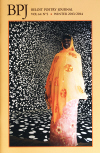Beloit Poetry Journal – Winter 2013/2014
This issue of Beloit Poetry Journal is chock-full of powerful poems with interesting word presentations. Eleven authors contributed fourteen individual pieces to a short, impactful magazine. Editor Lee Sharkey rounds out the volume with an interesting article in the Books in Review section titled “Poems in Conversation.” Of the many ways to write and present poetry, I agree with Sharkey that some of the best are mobile selections “spanning time and cultures in a spirit of reciprocity.” Snapshots of instances are often most celebrated as successful pieces of work in the literary world, but our current society is in constant motion and its best poetry should be appreciated for moving in that direction.
This issue of Beloit Poetry Journal is chock-full of powerful poems with interesting word presentations. Eleven authors contributed fourteen individual pieces to a short, impactful magazine. Editor Lee Sharkey rounds out the volume with an interesting article in the Books in Review section titled “Poems in Conversation.” Of the many ways to write and present poetry, I agree with Sharkey that some of the best are mobile selections “spanning time and cultures in a spirit of reciprocity.” Snapshots of instances are often most celebrated as successful pieces of work in the literary world, but our current society is in constant motion and its best poetry should be appreciated for moving in that direction.
Carol Anne Davis had three of her poems for Eva Hesse included (#1, #6, and #7). Each of them are presented sideways in the journal, making it necessary to physically turn the magazine for readability. Each of them were striking visually, I felt as if I were viewing the centerfolds of the magazine, as well as from a language perspective. One of my favorite lines, or stanzas, or sections (depending on how a reader would choose to define the three-column presentation of words) reads, “tried to work: going badly but what can I expect / of a god-child the children w. / tilted long faces women w. same.” The entire poem speaks to me of the type of jealousy that also carries reverence, as can also be read into the previous quotation. All three Davis poems span two pages and are worthy of being framed for their presentation and excellence.
Another uniquely presented poem in the magazine is “Hairstylist Sam Villa—Premier Orlando Main Stage” by Nicelle Davis. At a glance, it is apparent that excessive use of the forward slash helps frame the visual image of scissors, accenting the haircutting themes in the piece of work. Deeper inspections of the phrases, the ways they are arranged on the page, their meanings, made me realize there was more going on than just a trip to the barber shop. A single phrase, “We are relying on / our pattern and disconnection / to make things happen,” seems to be placed to clue in the reader that there are multiple things going on at once. I could comfortably study this poem for a long time and keep finding new things I like about it.
Earlier in this issue, a couple of poems tackle human history in bleak, though important ways. D. E. Steward takes a wide arching look at the instantaneous snuffing out of cultures in “Junea.” The poem is ancient Italy; is the origin of Mafioso; is the ultimate hit, with Vesuvius erupting. It expands beyond those boundaries near the end of its text with references to cell phones and 9/11, Japanese potters and Fukushima.
John Canaday, in “General Leslie Groves Counts to Zero,” does a wonderful job reminding me that the creators of one of the most destructive devices known to man were quite human and might have even carried a sense of humor within themselves. It is not a subject taken lightly, but rather a wake-up call that humanity is capable of multiple viewpoints about a subject and coping with the task at hand is a requirement in high stress situations. One of my favorite lines is, “our gadget will ignite the atmosphere, / wipe out the world—or just incinerate / New Mexico. A joke, to smooth frayed nerves,” stated by Oppenheimer, according to the author. Whether or not he actually spoke those words is not of great concern to me, but the fact that Canaday was able to reach past the weight of the world to find something that might have happened, that’s what makes this poem important to me.
All of the poems in this journal posit things that need considered. I hope you pick up a copy to consider them.
[www.bpj.org]





